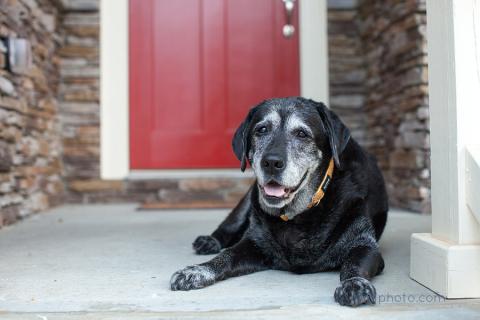
Published on February 21 by Julia
As dogs age, their behavior can change due to physical and cognitive decline. Understanding these behavioral shifts can help pet owners provide better care and improve their senior dog’s quality of life. Here are some common behavior problems seen in older dogs and how to address them.
Senior dogs may develop anxiety due to reduced cognitive function, hearing loss, or vision impairment. They might startle easily, become clingy, or show signs of distress when left alone.
Solution: Provide a consistent routine, use calming aids such as anxiety wraps, and ensure a safe, quiet environment. If needed, consult a veterinarian about anti-anxiety supplements or medications.
Older dogs may experience incontinence or forget their housetraining due to medical issues like kidney disease or cognitive dysfunction.
Solution: Increase bathroom breaks, use pee pads, and consult a vet to rule out underlying medical conditions. Medications or special diets may help manage incontinence.

Some senior dogs bark, whine, or howl more than usual. This could be due to cognitive decline, pain, or hearing loss.
Solution: Identify any underlying medical causes. Providing mental stimulation and comfort can help ease distress. White noise machines may soothe dogs with hearing loss.
Canine Cognitive Dysfunction (CCD), similar to dementia in humans, can cause confusion, disorientation, and difficulty sleeping.
Solution: Establish a calming bedtime routine, use nightlights to prevent disorientation, and talk to your vet about supplements or medications that support cognitive function.
Pain from arthritis or other conditions can make older dogs more irritable, leading to snapping or growling when touched.
Solution: Schedule regular vet check-ups to manage pain. Provide orthopedic bedding, gentle handling, and joint supplements to keep them comfortable.
Senior dogs may become less interested in play or exercise due to reduced energy levels or discomfort.
Solution: Encourage low-impact activities like short walks or puzzle toys. Adjust exercise routines to accommodate their needs while keeping them engaged.

Older dogs may seem lost in familiar places or fail to recognize family members due to cognitive decline.
Solution: Maintain a predictable routine and avoid rearranging furniture. Interactive toys and training exercises can help stimulate their brain.
Aging is a natural process, and behavior changes in senior dogs are common. By understanding these challenges and addressing them with proper care, pet owners can help their aging companions live a comfortable and happy life. Always consult a veterinarian for guidance on managing senior dog behavior effectively.
Discover More Content





